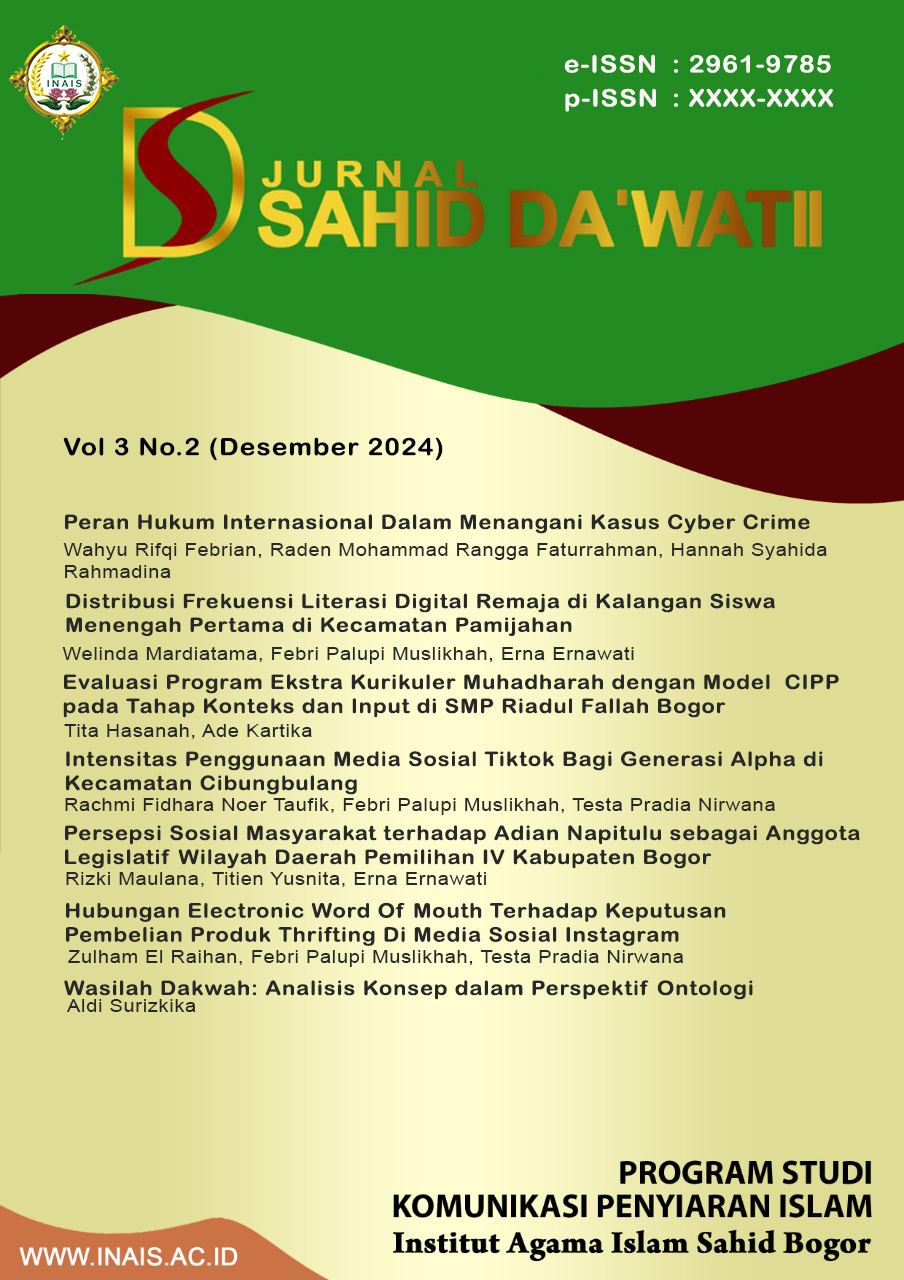PERAN HUKUM INTERNASIONAL DALAM MENANGANI KASUS CYBER CRIME
Isi Artikel Utama
Wahyu Rifqi Febrian
Raden Mohammad Rangga Faturrahman
Hannah Syahida Rahmadina
Fitra Deni
Cybercrime merupakan suatu kejahatan yang dilakukan melalui jaringan komputer sebagai alat utama si
pelaku dalam melancarkan aksinya. Jenis kejahatan siber ini mencakup beberapa aktivitas ilegal seperti hacking,
phising, ransomware, malware, identity theft, dan lain sebagainya. Cybercrime telah menjadi ancaman global yang
memerlukan kerjasama internasional untuk penanggulangannya. Keamanan siber saat ini menjadi hal fundamental
yang harus diperhatikan oleh masyarakat ataupun pemerintah. Sistem keamanan siber yang lemah akan menjadi
sasaran para hacker dalam melancarkan aksinya. Tidak hanya itu, lemahnya penegakan hukum dalam menangani
kasus ini juga menjadi celah bagi para hacker untuk selalu melakukan perbuatannya. Oleh karena itu, berbagai
instrumen seperti konvensi tentang cyber crime, hukum internasional, dan kerjasama internasional menjadi senjata
utama dalam menangani kejahatan siber. Dalam artikel ini, penulis akan menganalisis bagaimana peran hukum
internasional dalam menangani kasus cybercrime, termasuk mekanisme dan instrumen yang ada serta tantangan yang
dihadapi dan efektivitas kerjasama internasional dalam melawan jaringan kejahatan siber. Penelitian ini bertujuan
untuk mengetahui peran hukum internasional dalam menangani kasus cyber crime, tantangan dalam penerapan hukum
internasional, instrumen hukum internasional dan efektivitas kerjasama internasional. Penelitian ini menggunakan
pendekatan kualitatif dengan analisis dokumen dan studi kasus untuk mengeksplorasi efektivitas dan kelemahan
hukum internasional dalam menghadapi kejahatan siber. Hasil penelitian menemukan bahwa peran hukum
internasional masih belum maksimal akibat berbagai tantangan dalam implementasinya, namun dengan Indonesia
tidak meratifikasi Konvensi Budapest hal ini menghambat peran instrumen hukum internasional dalam
menanggulangi kasus cyber crime di Indonesia. Meskipun seperti itu, peran hukum internasional masih dibutuhkan
untuk memaksimalkan peluang kerjasama internasional yang dilakukan oleh pihak berwenang dalam melawan kasus
kejahatan siber.
Wahyu Rifqi Febrian, UIN Syarif Hidayatullah Jakarta
Wahyu Rifqi Febrian adalah mahasiswa program studi Hubungan Internasional di Universitas Islam Negeri Syarif Hidayatullah Jakarta. Minat penelitiannya di bidang Hubungan Internasional adalah mendalami dinamika diplomasi, kebijakan luar negeri, dan peran komunikasi dalam membentuk persepsi dan mengelola konflik antarnegara.
Raden Mohammad Rangga Faturrahman, UIN Syarif Hidayatullah Jakarta
Raden Mohammad Rangga Faturrahman adalah mahasiswa program studi Hubungan Internasional di Universitas Islam Negeri Syarif Hidayatullah Jakarta. Minat penelitiannya di bidang Hubungan Internasional adalah mendalami dinamika diplomasi, kebijakan luar negeri, dan peran komunikasi dalam membentuk persepsi dan mengelola konflik antarnegara.
Hannah Syahida Rahmadina, UIN Syarif Hidayatullah Jakarta
Hannah Syahida Rahmadina adalah mahasiswa program studi Hubungan Internasional di Universitas Islam Negeri Syarif Hidayatullah Jakarta. Minat penelitiannya di bidang Hubungan Internasional adalah mendalami dinamika diplomasi, kebijakan luar negeri, dan peran komunikasi dalam membentuk persepsi dan mengelola konflik antarnegara.
Fitra Deni, UIN Syarif Hidayatullah Jakarta
Fitra Deni adalah seorang dosen pengantar ilmu hukum di Fakultas Ilmu Sosial dan Ilmu Politik Universitas Islam Negeri Syarif Hidayatullah Jakarta.













